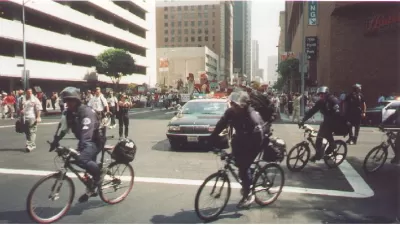The 'Vision Zero' movement to eliminate pedestrian deaths is fantastic. It is helping cities around the world create better, safer streets. The name and its embrace of absolutes dooms cities to failure.
The "Vision Zero" movement is influencing planners around the world, encouraging them to give greater advantage to humans in the century-old battle between pedestrians and cars. A dozen cities in the United States, including Los Angeles, San Diego, and San Francisco, have adopted its principles. The principles are admirable, writes Josh Stephens in the California Planning & Development Report. The name, though, is antithetical to how planning actually works.
"Accidents are going to happen, even in Copenhagen. Someone is going to bust an inner tube and hit the curb. Someone is going to slip on a carelessly discarded smørrebrød. Someone will get tangled in his scarf and end up in a canal. Even perfect cities aren't perfect."
"The fact is, planning can never eliminate all bad things -- whatever the thing happens to be. In the case of pedestrian safety, it can absolutely reduce deaths. It can, if you go back to high school calculus, approach zero. But this is still a free country. Unless Los Angeles bans cars entirely and replaces all its pavement with compacted marshmallow, it can never reach zero. Not in 2015, not in 2035, not ever. In the battle between absolutes and public policy, policy never wins."
FULL STORY: A Plan with 'Zero' Chance of Success

Maui's Vacation Rental Debate Turns Ugly
Verbal attacks, misinformation campaigns and fistfights plague a high-stakes debate to convert thousands of vacation rentals into long-term housing.

Planetizen Federal Action Tracker
A weekly monitor of how Trump’s orders and actions are impacting planners and planning in America.

San Francisco Suspends Traffic Calming Amidst Record Deaths
Citing “a challenging fiscal landscape,” the city will cease the program on the heels of 42 traffic deaths, including 24 pedestrians.

Bend, Oregon Zoning Reforms Prioritize Small-Scale Housing
The city altered its zoning code to allow multi-family housing and eliminated parking mandates citywide.

Amtrak Cutting Jobs, Funding to High-Speed Rail
The agency plans to cut 10 percent of its workforce and has confirmed it will not fund new high-speed rail projects.

LA Denies Basic Services to Unhoused Residents
The city has repeatedly failed to respond to requests for trash pickup at encampment sites, and eliminated a program that provided mobile showers and toilets.
Urban Design for Planners 1: Software Tools
This six-course series explores essential urban design concepts using open source software and equips planners with the tools they need to participate fully in the urban design process.
Planning for Universal Design
Learn the tools for implementing Universal Design in planning regulations.
planning NEXT
Appalachian Highlands Housing Partners
Mpact (founded as Rail~Volution)
City of Camden Redevelopment Agency
City of Astoria
City of Portland
City of Laramie





























